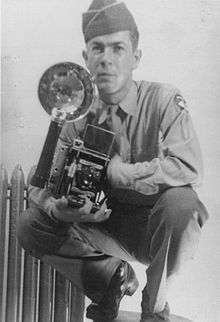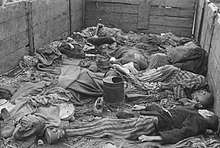Paul Richard Averitt
Paul Richard Averitt (August 7, 1923 — August 7, 2001) was an American soldier serving as a member of the US Army 92nd Signal Corps Battalion. He was one the first photographers taking pictures at Dachau concentration camp during its liberation on April 29, 1945.
Paul Richard Averitt | |
|---|---|
 Paul Averitt in 1945 | |
| Born | August 7, 1923 |
| Died | August 7, 2001 |
| Nationality | American |
| Known for | He was one the first photographers taking pictures at Dachau concentration camp during its liberation on April 29, 1945. |
Early life
Averitt was born in Nashville, Tennessee as son of Henry Clark Averitt (1892-1947) and Bessie Mai Baker Averitt (1890-1987). He had an older brother, James Edwin Averitt (1920-1981).[1] He graduated from East High School.[2]
Army
On January 30, 1943 he enlisted and was assigned to the U.S. Army 92nd Signal Battalion Company A as a telephone and telegraph lineman. His duties were primarily to set up the communications prior to the movement of the troops. He spent more than one year in England and Ireland. Thereafter, his company went to Normandy on July 13, 1944 – one month after D-Day. They joined General Patton's Third Army and accompanied them through the North of France and the Rhineland. Company A often first arrived in an area vacated by the Germans and Paul Averitt documented his tour of duty in hundreds of photographs.
On April 29, 1945 he arrived at Dachau concentration camp, only hours after its liberation. Before entering the camp, Averitt came upon the death train from Buchenwald, and captured the corpses of the prisoners in at least seven photographs.[3] He also documented the Dachau liberation reprisals, the revenge act of US troops killing some 30 to 50 SS guards – enraged after discovering the mass murder in the train and in the camp.
Post army life
Averitt returned to the United States and was released from duty on December 2, 1945. Thereafter he worked for the family owned plant John Bouchard & Sons for forty years. He married Gradye Ruth. The couple had four daughters and eight grandchildren.[1][2]
Photographs
- Corpses of prisoners in Dachau concentration camp
- Death train from Buchenwald
References
- Ancestry: Paul Richard Averitt, accessed 3 October 2016
- The Tennessean (Nashville, TN): 2001 Paul Richard Averitt obituary, August 9, 2001, p. 21
- Paul Averitt: The corpse of a prisoner lies next to the train tracks in Dachau, retrieved on October 1, 2016
External links
| Wikimedia Commons has media related to Paul Averitt. |
- United States Holocaust Memorial Museum: Collections Search for Paul Averitt, October 2, 2016, this page contains 15 photographs by Averitt.
- The Dachau Death Train, description on Scrapbookpages








